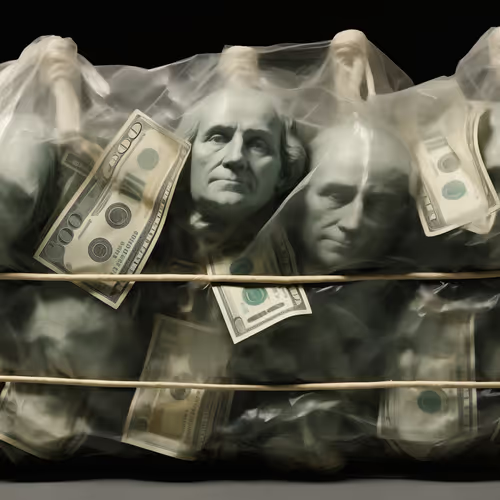In the heart of a skyscraper-laden city, high above the bustling streets, lived Elon Bennett, a billionaire known for his lavish lifestyle and indomitable confidence in the market. His penthouse apartment boasted a view that seemed to stretch infinitely, a sprawling canvas of wealth and power draped over the city below. Yet, beyond the glass and steel, an unsettling shift was occurring—a quiet tremor that whispered through the financial world, hinting at the inevitable end of fiat money.
It began subtly. At a gala held in the grand ballroom of his hotel, Elon mingled with fellow elites, their laughter echoing off gilded walls. As waiters circulated with trays of expensive champagne, hushed conversations gripped the corners of the room. A once-dominating discussion about stock tips had transformed into anxious murmurs about the instability of currency.
“A dollar used to mean something,” one guest remarked, swirling his drink. “Now it feels like dust blown in the wind.”
Elon shrugged it off. The world always spoke of calamity; it was just noise, he thought. He was insulated from such concerns, living in the cushy cloud of privilege. He had investments, properties, and the means to weather any storm.
But the next morning, a headline flashed across his news feed: “Global Currency Crisis: Fiat Money Nears Collapse.” The ink-black text felt like ice in his veins. He scrolled through a barrage of articles documenting the rapid devaluation of the dollar. Countries were turning to cryptocurrencies, bartering goods, and exchanging services directly—challenges to the very foundation of his wealth.
That evening, in disbelief, Elon boarded his private jet to an exclusive island retreat, desperate for solace. As the sun dipped behind the horizon, painting the sky in strokes of orange and purple, he caught sight of a startling scene below. A gathering of locals was trading goods—fresh fruit, handmade crafts, and services. The barter economy thrived beautifully in stark contrast to the financial turmoil his world faced.
Once he arrived, Elon strolled through the market. He offered money for a bottle of water, but the vendor simply shook her head, gesturing to the overflowing baskets of fruits and vegetables instead. “Trade for trade,” she insisted, a smile on her face that spoke of independence.
Days passed, and Elon began to immerse himself in this new reality. He engaged with locals, exchanging a watch for bread, a vintage book for hand-stitched fabric. Each transaction felt rich, fulfilling, and, for the first time, meaningful.
As he shared stories around a fire each night, he noticed how genuine connections blossomed amidst the simplicity. The world outside his penthouse felt less like a distant, thriving ecosystem and more like a shared community, built on trust rather than currency.
When Elon finally returned to his city, the skyscrapers looked different—less like monuments to wealth and more like relics of a past that no longer held meaning. Armed with newfound wisdom, he began to rethink his empire. Rather than hoarding wealth, he envisioned projects that could foster connections and strengthen communities.
Underneath the glimmering lights, he realized that value wasn’t confined to dollars; it thrived in relationships, creativity, and shared experiences. And in that moment, the end of fiat money felt less like a crisis and more like the beginning of something extraordinary—a chance to build a new future, where worth was redefined, transcending the limits of paper and digits.
